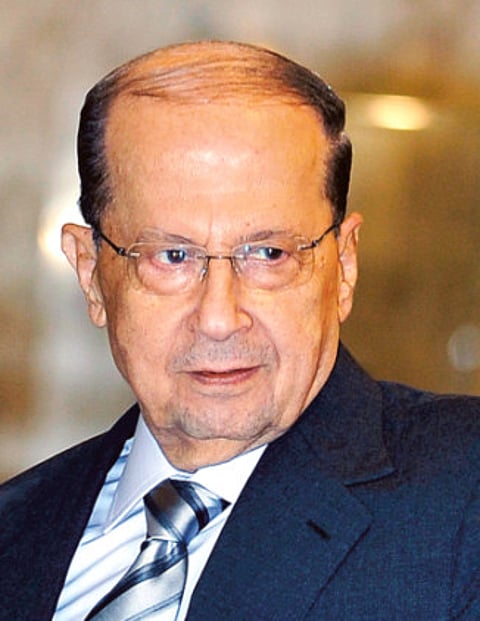Will Aoun run for president in Lebanon?
Uncertainty clouds Aoun’s decision as politicians hedge their bets

Tokyo According to the Lebanese daily Al Safir, the Speaker of the Lebanese Parliament, Nabih Berri, plans to call for a parliamentary session on either April 22 or April 23 to elect a successor to President Michel Sulaiman, whose six-year term ends on May 25. Aside from this newspaper report announcement there have been no other announcements regardinga possible date. In order for a president to be selected in Lebanon, he has to secure two-thirds majority on the first ballot or 65 [64+1] out of 128 votes after the second. To ensure the minimum-needed votes, consensus is typically reached prior to the date of elections. This consensus now seems muddled as various political parties began to weigh in on their preferred candidate.
To date, only Lebanese Forces leader Samir Geagea has formally announced his candidacy for the post, reserved for Maronite Christians by the 1943 National Pact.
Interestingly, the Marada Movement chief Sulaiman Franjieh emphasised that he would not run without the approval of his March 8 ally. Free Patriotic Movement principal General Michel Aoun who, in a rare moment of strategic assessment, concluded that he would not be a presidential candidate against Geagea, if the latter gained the support of Sa’ad Hariri’s Al Mustaqbal [Future] Movement.
While the Future movement has not outright said they would back Geagea, it is widely assumed they will, and given that they hold a majority of seats, would make Geagea the strongest candidate. Therefore, Aoun is likely not to put himself up for election.
Hezbollah, which holds 8 seats in parliament and is part of the broad-based pro-Syrian March 8 coalition, has said it has reached a decision on its favourite candidate, but will not yet reveal his name.
Some statements by politicians, however, have hinted that Aoun’s candidacy could very well be considered. Some of Aoun’s parliamentary blocs as well as his relative, Alain Aoun, have made comments that Aoun would be a consensual candidate rather than a partisan candidate and called on “all political forces [to] begin to determine their positions regarding the presidential [elections] starting today,” which could be interpreted as an invitation to Hezbollah to endorse Aoun.
The awareness that the country’s leading politicians would broker a behind-the-scenes agreement may also have prompted Michel Aoun to issue his cautionary evaluation regarding his refusal to commit in case Sa’ad Hariri threw down the gauntlet and backed Geagea.
Favourable condition
“If the March 14 coalition and Al Mustaqbal Movement announce their support for Geagea, I will not nominate myself,” Aoun stated in an interview on the pro-Iranian Al Mayadeen television station, adding: “I will not be a nominee against Samir Geagea. I don’t want to run against anyone.”
In other words, what Aoun desired was a clean deal that would see him elected on the first-ballot, rather than submit to the electoral grind that would drag over several votes. For Aoun to even consider running necessitated favourable conditions or else he wouldn’t bother. Aoun, the pro-Syrian Free Patriotic Movement leader, knew deep down that he could not possibly win without the support of Hezbollah and Walid Junblatt’s Progressive Socialist Party, whereas Geagea was ensured a majority if the March 14 alliance remained united with the addition of several swing votes.
Still, he relied on the March 8 coalition despite several cleavages existed within it on account of internal, regional and international tensions.
Walid Junblatt’s Socialist party could be among those parties with reservations against Aoun.
Clearly now the ball is in former Prime Minister Sa’ad Hariri’s court who could return from his security-imposed exile in Saudi Arabia to assume the premiership. Hariri openly fears for his life as there have been a string of political assassinations over the years against anti-Syrian politicians in the country, and especially feels under threat while the Syrian war brews next door.
Sign up for the Daily Briefing
Get the latest news and updates straight to your inbox



